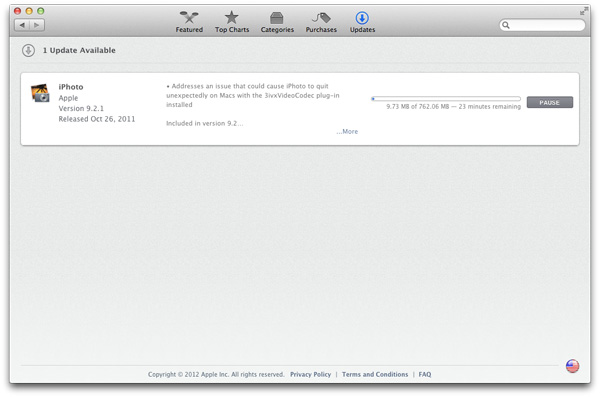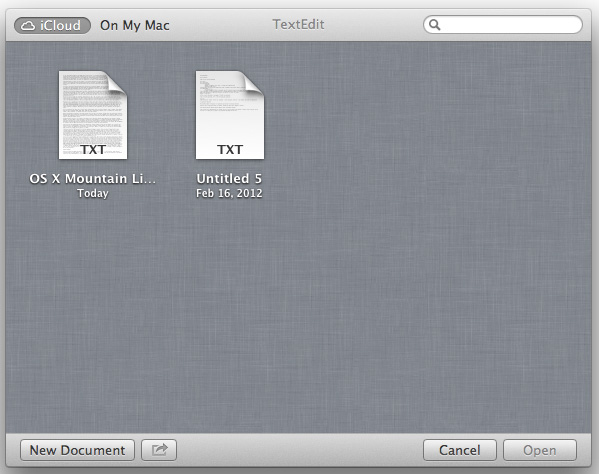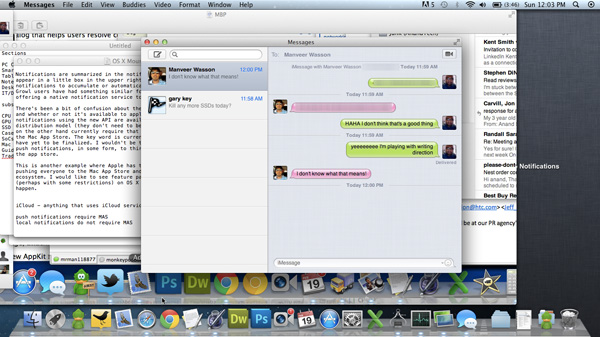Thoughts on the Mac OS X Mountain Lion Developer Preview
by Andrew Cunningham & Anand Lal Shimpi on February 19, 2012 7:40 PM EST- Posted in
- Mountain Lion
- Mac
- macOS
Software Updates & Moving Toward the Mac App Store
To be honest, I rarely use the Mac App Store. I appreciate it because it does let me quickly get Apple applications without fumbling for a restore DVD somewhere, but otherwise I get all of my non-Apple apps directly from the source. The app store makes sense to me on iOS because that's the only option we were presented with from the start, but even there I would appreciate the flexibility of installing apps from any source. On a Mac the opposite is true. Just as was the case on PCs, I've always grabbed and installed software on my Macs from a multitude of sources and I've never really wished there was a centralized, policed repository of Mac applications. That being said, I do understand and accept that I may be a part of a shrinking minority. Apple's most successful products have been those sold effectively as appliances. The MacBook Air took many steps in the same direction by offering no end user upgradeable CPU, memory, storage or battery options. With the MBA you're buying some sort of a Mac appliance hybrid. It's a good device (I'm typing this article on an MBA now), but in many ways it's an inflexible one.
My fear is that as Apple straddles this line between the old and the new, that it will step over too far into the walled garden/appliance territory. That OS X, just like iOS, will become a platform powered only by the app store. That isn't the reality today and I hope that it never will be, but the temptation is surely there. Apple gets a cut of all software sales through the Mac app store, it doesn't elsewhere. App stores are a way of continuing to profit off of a platform after you've sold the initial hardware and operating system. From a customer experience standpoint there's also significant motivation behind supporting only a centralized app store. With complete control of what can run on the platform, Apple could guarantee and maintain the level of experience that it's always been in pursuit of.
Again, today, this isn't a problem but there's definitely movement in that direction. Mountain Lion does away with Lion's Software Update mechanism and instead integrates that into the Mac App Store directly.

There's no change in functionality, just a change in physical location. I will admit that the software update tool always felt like it needed...updating, but I don't know that I would've put it in the MAS application.

Remember all of the new APIs that developers now have access to? A couple of them are only available to applications distributed via the Mac App Store. The big one is iCloud. Any application that interfaces with or uses iCloud is required to be in the MAS. It's the tradeoff you make when you start using Apple's cloud storage as a selling feature of your application. There are ways around this requirement (you could decouple any cloud storage features from your main application and simply offer the former through the app store) but it's a bifurcation of the Mac software feature set for the most part.
The notification story is a little different.
New Notifications API & Interface
Revamping notifications was a major part of the iOS 5 update last year and Apple decided to bring some of that to OS X. Mountain Lion sports a new iPad-like notification center that's accessible by performing a right to left, two finger swipe on a multitouch trackpad. The gesture is unique in that it's the first gesture that must be started at the very edge of the trackpad. A two finger right-left swipe starting in the middle or even an inch from the border of the trackpad is different entirely. To bring up the notifications menu you have to start the gesture at the very edge of the trackpad. It's easier to just start swiping off of the trackpad first, allowing the gesture to then continue onto the trackpad surface. The notification center gesture is very reminiscent of the PlayBook/webOS bezel gestures that have similar requirements for starting outside or at the beginning of the touch area.

Notifications are summarized in the notification center but as they happen they appear in a little box in the upper right of your screen. You can configure notifications to accumulate or automatically disappear after a short period of time. Growl users have had something similar for a while now, but Apple is now officially offering a native notification service to all developers.
There's been a bit of confusion about the new notifications API (NSUserNotification) and whether or not it's available to applications not in the Mac App Store. Local notifications using the new API are available to third party apps regardless of their distribution model (they don't need to be in the Mac App Store). Push notifications on the other hand currently require that the application is distributed only through the Mac App Store. The key word is currently because a lot of Mountain Lion decisions have yet to be finalized. I wouldn't be too surprised if Apple decides to open up push notifications, in some form, to third party applications not distributed through the app store.
This is another example where Apple has to carefully straddle the line between pushing everyone to the Mac App Store and not abandoning the rest of the Mac software ecosystem. I would like to see feature parity regardless of distribution model (perhaps with some restrictions) on OS X going forward, but I'm not sure that will happen.










96 Comments
View All Comments
FWCorey - Tuesday, May 1, 2012 - link
And what makes games so much less relevant on a platform that has more consumer users than commercial users?Windows has given them a high priority for ages despite the fact that OS's demographic balance swings in the opposite direction.
marioyohanes - Monday, February 20, 2012 - link
Thanks for extensive review on the new upcoming OS X Mountain Lion.Since you guys are the most reliable sources for SSD, I was wondering whether OS X Mountain Lion has better support for SSD or not, specifically with 3rd party SSD?
I have 2 different SSDs, Intel 320 and Vertex 3 installed on both 2011 MBP and 2009 MBP, and it always gets corrupted right after OS X update or Safari update under Mac OS X Lion (never have this problem on SL).
I really hope Mountain Lion could brings better support for 3rd party SSD than it does on Lion. Because why bother buying new hardware if you'll get stuck with 5400 rpm hdd :)
vectorm12 - Monday, February 20, 2012 - link
Considering Apple would much rather charge you 500+ USD for a 256GB SSD that's a decent performer at best I'd say we're out of luck on any kind of support on 3:rd party SSDs. In fact I wouldn't be the least bit surprised if Apple in fact chose to limit booting from 3:rd party storage in the near future.Interesting about your Vertex 3 being corrupted after OS X updates. I've been running Lion for the better part of a month on my early '11 13" macbook pro I have for work with a Vertex3 Max IOPS and haven't seen any real issues thus far.
I do however see intermittent slowdown at times which I've thus far figured to be TRIM related. Especially when waking the system from sleep/hibernation. Perhaps I've been to quick to jump to conclusions about those issues?
All in all I see where Apple wants to take OSX and their platforms in general, but I can't help but pray people won't keep accepting all the limitations since it's really bad for all consumers in the long run.
Otherwise we'll be running IOS 8 on mac hardware and being forced to jailbreak new mac pros as well.
KPOM - Monday, February 20, 2012 - link
From what I have seen on the developer preview, it does not. I'm assuming the hacks still work, but I haven't tried them. My guess is that we'll see the MacBook Pro line either merge with the Air or become less user-upgradable in the future (perhaps RAM will still be upgradable), at least in the 13" and 15" models, so I wouldn't bet on adding TRIM support for third party drives. I've heard that Apple makes as much or more money on NAND as the manufacturers of the NAND themselves.zdzichu - Monday, February 20, 2012 - link
First page discussing rapid release cycles fails to mention Linux distributions. Major distributions shifted to half-year release cycle few years ago (pioniereed by Fedora in 2003 and Ubuntu in 2004). This pace works very good for consumer software.damianrobertjones - Monday, February 20, 2012 - link
"Microsoft announced a planned shift to a 3-year OS release cadence."Didn't they previously have this 3 year release thing? Pretty sure that they did
cjs150 - Monday, February 20, 2012 - link
Actually I do not hate apple, it has a philosphy that does not work for me.Mountain Lion is clearly yet another step towards the walled garden approach that Apple wants. This approach will result in thinks that "just work", like any number of consumer electronic products. This is why many people at my work love Apple.
But this approach has its downside, if all you want is something that "just works" then you do not need to know how it works and you are stuck with Apple's design decisions (eg no true HD on Apple TV). I want to know how things work, I want to be able to fiddle with settings, add programs that genuinely extend or enhance my working experience.
A simple example. I have a young daughter (10) who is starting to ask for a computer in her bedroom. I have said that if she wants one and can explain why, she can have one but on the condition that it will arrive in bits and she will have to build it herself and install all the software. Admittedly this is a good parent trick to ensure the computer issue is deferred by at least 6 months, but assuming it happens it will teach my daughter very quickly how computers work, what bits are in a computer and how to install software and generally ticker with the computer. Apple take all that away - the computer should be simply a higher priced version of a washing machine - plug it in and away you go.
tim851 - Monday, February 20, 2012 - link
What if your daughter wants a laptop?I've been managing my parents' PC for a while now. I could be a dick like you and tell them they have to do build it themselves, but I realized that not everybody is a nerd or has the time to become one and ultimately a PC is just an appliance like a fridge or a tv. I didn't make my mom assemble her car either.
Next time you go into the supermarket to buy a steak, I hope they hand you a knife and point to a nearby cow.
bji - Monday, February 20, 2012 - link
The obvious difference between your hypotheticals and his real situation is that he is the parent and its his responsiblity to educate his children and guide their development. It is not your responsibility to educate or guide your parents nor is it the responsibility of the supermarket to educate its customers on how cows are turned into steaks. There's no need to call cjs150 a dick just because you couldn't formulate this simple concept yourself.vectorm12 - Monday, February 20, 2012 - link
While I do agree with you for the most part I see a problem with "our" view of how things are supposed to work.The big issue is a lot of people want the "washing machine"-experience with computing devices. Heck even at times I do and it's something that is required at this point in my mind simply because most people choose the simplest/easiest way to get things done whenever possible. Most people simply choose rather not to use a function than actually learn how to use it.
However I feel Apple as well as all others should provide a simple switch to disable to "walled garden" and expose the OS to people who choose to do so. In my mind that's the best of both worlds. Dumb it down for the people who couldn't care less, keep the techs happy who actually use and promote the devices.